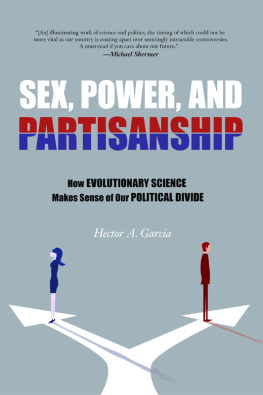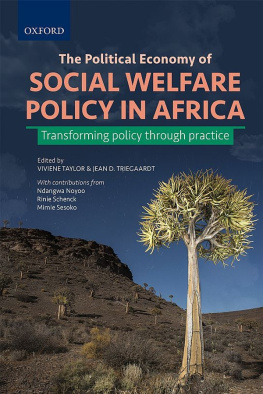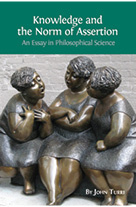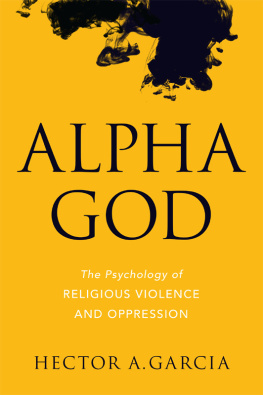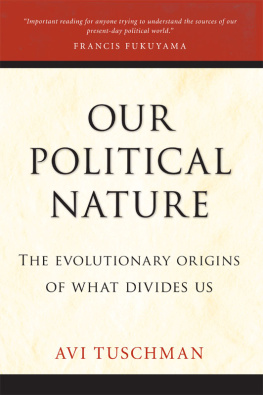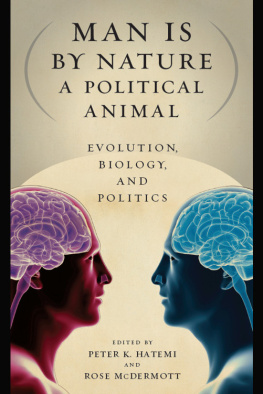
First, I would like to thank Avi Tuschman for his comments and for his foundational book Our Political Nature. His work greatly stimulated my thinking. Thanks, too, to Benjamin Purzycki for his ever-insightful perspectives, and to Jessica McCutcheon for her careful editing. Rose McDermott's research and her energetic feedback on a significant section of this book were tremendously valuable. Melissa M. McDonald graciously shared her expertise in evolutionary psychology and provided a thoughtful review, for which I owe a debt of gratitude. I am deeply grateful to Sebastian Junger for a generous exchange of ideas, and for encouraging me to pull the trigger on this book when it was still in the formulation stage. This and his inspiring writing took me a long way.
Erinthis book would not be possible without your support, which you provided in every conceivable way, not the least of which being your tireless, incisive review of every page. Engaging with your exceptional mind improves my work, nourishes my intellectual growth, and is one of life's greatest pleasures.

Animals eat one another without qualm; civilized men consume one another by due process of law.
Will and Ariel Durant, The Lessons of History, 1968
A nation's sinew begins to tear. Triumph in one group is met with fear and bewilderment in another. Old prejudices are reanimated; new ones are invented. The masses succumb to irrational forces, prodded to frenzy by politicians and the media. The nation is poised to devour itself.
The controversial election of Donald Trump as the forty-fifth US president polarized the United States more than any other time in its contemporary history. To those watching, it seemed remarkable, and yet the partisan division was a familiar enough scenario, even in the United States. The 1960s saw police and the right wing clash violently with the leftist counterculture and with the civil rights and antiVietnam War movements. In the 1950s, McCarthyism drove the nation into repression, fearmongering, and political paranoia. Panic over Communism destroyed countless Americans careers, or saw them wrongly imprisoned for treason. A century before, the American Civil War drenched the nation's soil with the blood of over 600,000 people, greatly as a result of disagreement over slavery; even in the twenty-first century, bloody clashes between the Left and Right have erupted over the place of Confederate monuments in America. All of these schisms have been grounded in partisan psychology. Such Left-Right divisions are old, seen all over the world, and, in some form or another, certain to continue.
But why are these periods of conflict so common across nations and history? To truly understand the turmoils of today we must look somewhere most of us are unaccustomed to lookingour primordial past. Our current political struggles are ancient, rooted in a time before we even had nations, and indeed before we were fully human. What I will show you in this book is that the difficulties we face forming cohesive societies in the modern era reflect psychological adaptations with a simple, ancient purposekeeping our ancestors alive in savagely dangerous environments. All too often these adaptations are at odds with the environments in which we currently live. This mismatch between the ancient and the modern is at the core of what divides us along political lines. While we will excavate far below the landscapes of our political parties in search of answers, political partisanship will remain a key framework because when nations turn against themselves, a reliable fracture opens between the political Left and Right.
To begin to understand this fracture, let's turn to an unlikely source for psychological insight: media pundits. American political commentator and talk show host Chris Matthews once described Republicans as the Daddy Party and Democrats as the Mommy Party. Writes Matthews,
Republicans protect us with strong national defense; Democrats nourish us with Social Security and Medicare. Republicans worry about our business affairs; Democrats look after our health, nutrition and welfare. Republicans control the White House; Democrats provide a warm, caring presence on Capitol Hillit's the traditional American family. Daddy locks the door at night and brings home the bacon. Mommy worries when the kids are sick and makes sure each one gets treated fairly. This partition of authority and duty may seem an anachronism from the Leave It to Beaver era, but it's an apt model for today's political household.
Similarly, in a play on John Gray's best seller on the differences between men and women, Men Are from Mars, Women Are from Venus, As it happens, these observations are far more empirically accurate than we might have imagined.
Naturally not all men are conservatives, and not all women are liberal. In fact, research suggests a link between partisanship and gendered psychology. The term gender often describes masculine or feminine traits that may be expressed independent of sex and very often honed in their expression by culture. But even though gender can exist independently of biological sex, as we will learn throughout this book it is not independent of biology. Neither is politics.
To help us safely foray into this treacherous crossroads of gender, sex, and politics (as we move forward, religion will also cross this path), let us proceed with the understanding that in the grand scheme of human psychology, men and women, and liberals and conservatives, exhibit far more similarities than differences across innumerable psychological indicesdaddies also worry when the children are sick, and mommies too bring home the bacon. Nevertheless, we venture into the slivers of difference, for those slim terrains abound with explanatory information about our evolved political psychology. The old adage that one should never discuss sex, politics, or religion in polite company would suggest that hazarding there could be fraught. Given the outlandishly controversial status of evolution, in America anyway, this topic may have a similar impact. But even a casual read of the history of political division reveals that the consequences of not understanding are far worse than the discomfort of knowing.
This book is about how Stone Age mating gave rise to our political orientations. More specifically, it is about how evolution programmed our minds with mating strategies to help us reproduce amid a fierce field of competition, how men and women employ different strategies to achieve reproductive fitness (i.e., representation in the gene pool), and how political partisanship arises from these sex-based approaches to perpetuating our genes. More precisely, I explain how all the hallmarks of political conservatismits tribalistic flavor (us versus them), its emphasis on female sexual control, and its hawkish and territorial natureare rooted in male mate competition, the ageless biological struggle for reproductive dominance. Far exceeding the scope of any government sex scandal, male competition for women turns out to be the core driving force behind contentious political issues as wide-ranging as affirmative action, social welfare, gender equality, contraception, abortion, taxes, criminal law, and foreign policy. Even the winner-take-all mentality of conservative economic policy is based on male competition for mates.
War, by necessity, is a critical focus of this book because it is rooted in team-based male-mate competition, and because our evolutionary forensics finds its crimson fingerprints all over our gendered political orientations. The risk of being annihilated by the outside tribeand the potential gains of taking over the rival tribe's territory, resources, and womenforged the coalitionary psychology of men. Here I will show you how the militaristic logic embedded in that psychology maps squarely onto all the hallmark values of political conservatism. It is from the context of violent male mate competition, and its most heightened expression, war, that we are able to most fully understand the masculine tenor of conservative political psychology, along with the set of complex emotional responses that are roused in the conservative clash with the Left.
Next page
